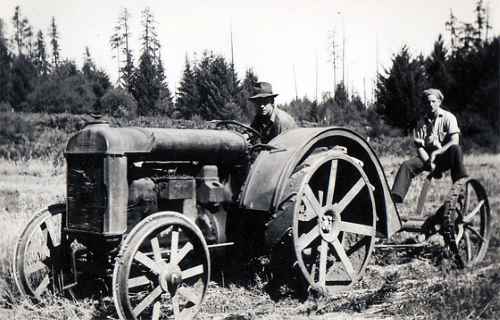Survival Skills Of The Great Depression Era
We can learn from the philosophy of ‘using and reusing’ that Depression era folks were forced to live with. We can learn by examining what the skills were during the Great Depression era. Who were those that were able to find some work, those who were better able to survive those very difficult times?
What were the survival skills of that time and would they apply to surviving in a future post-collapse world? Warning To America — When The Economy Crashes In 28 May 2016 Parts Of America Will Resemble A 3rd World Country
Frugality
Perhaps the most learned skill during the era of the Great Depression was that of frugality. Frugality in all things.
People had no choice but to make do with very little. They managed to survive. The things we throw away today or the things we take for granted would be treasured and used to its fullest back then…
Every scrap of food. Everything. Every part was used to its fullest potential.
You know how most people throw out what’s left of a ketchup or mustard bottle (for example) with maybe that last inch of stuff on the bottom that won’t come out? Well they would get it out… Add a bit of water in there and shake it up, and it will come out. Things like that… frugality. No waste.
When clothes became too worn out, they were mended or patched up, sewn. (How many people can actually sew today?) When clothes became too worn to wear, the materials were used as rags, mops, whatever.
Frugality was a necessity of life. Nothing at all was thrown out.
They would improvise, adapt, and overcome.
A mindset.
Word of the day: Prepare! And do it the old fashion way, like our fore-fathers did it and succeed long before us, because what lies ahead of us will require all the help we can get. Watch this video and learn the 3 skills that ensured our ancestors survival in hard times of famine and war.
Homesteading and Farming Skills
Farms. There were lots of farms back then. Today in the United States, fewer than 1 percent claim farming as an occupation.
The farm was a place where resources and nothing went to waste. The cows, chickens, livestock were mostly fed from the food that was grown on the farm as much as possible. Old bread, corn cobs, apple cores, and other kitchen scraps were fed to the hogs. Then the livestock’s manure was collected and used to fertilize crops. Become a Millionaire on One Acre with Aquaponics
The farming lifestyle was self-sustaining. Gardening. Food preservation. Outdoor skills. Animal husbandry. Butchering. It involved many and countless hands-on skills from building fences to successfully growing foods to managing livestock, and everything in-between. If you lived on a farm, and the farm was not indebted (or indebted beyond the ability to keep paying), then you could survive.
Handyman
A good handyman, someone with construction skills, someone who knew how to fix ‘anything’ so to speak, or patch anything up and make it work again, was someone who could perhaps occasionally find some work or trade his services for food or shelter for awhile. Subsets of a handyman might include carpentry, masonry, plumbing.
To become a ‘handyman’ requires practical life-experience knowledge and skills from ‘doing’. It is learned through action. Getting one’s hands dirty…
Mechanic
To fix machines, machined things, and/or vehicles. Someone who knows tools and has knowledge and skills using equipment like the lathe, the milling machine, the drill press, the saw, grinding, forging, welding, etc.. Knowledge of how vehicles work. Engines. Pumps. Hydraulics. And the tools to work with…
Health care
There always was and there always will be those who need medical care. The field of health care, doctors, nurses, etc.. was and will always be a necessary service and skill(s). The advancements in this field have been tremendous and extraordinary compared to the era of the Great Depression. That said, without the technologies of today, there will still always be demand for those who can help others with their medical needs and conditions, emergency or otherwise.
I’ve listed a few depression era skills above, and I believe that they would apply towards what would be valuable during life in a post-collapse world where we’re set back in time so to speak.
Let’s hear your additional thoughts about what may have been ‘valuable’ skills back then, and what survival skills might be valuable in a similar (but probably much more dangerous) world of tomorrow… ?
SOURCE : modernsurvivalblog.com
Don’t wait until food becomes scarce; start preparing for the future now by becoming as self-reliant as possible. Your long-term chances of survival could very well depend on your ability to feed yourself and your family without relying on someone else.
The Lost Ways (Learn the long forgotten secrets that helped our forefathers survive famines,wars,economic crisis and anything else life threw at them)
Survive Attack to Our Power Grid System (Weapon That Can Instantly End Modern Life in America)
Survival MD (Best Post Collapse First Aid Survival Guide Ever)
Backyard Innovator (A Self Sustaining Source Of Fresh Meat,Vegetables And Clean Drinking Water)
Blackout USA (EMP survival and preparedness)
Conquering the coming collapse (Financial advice and preparedness )
Liberty Generator (Build and make your own energy source)
Backyard Liberty (Easy and cheap DIY Aquaponic system to grow your organic and living food bank)
Bullet Proof Home (A Prepper’s Guide in Safeguarding a Home )
Family Self Defense (Best Self Defense Strategies For You And Your Family)
Survive Any Crisis (Best Items To Hoard For A Long Term Crisis)
Survive The End Days (Biggest Cover Up Of Our President)
Drought USA (Discover The Amazing Device That Turns Air Into Water)


